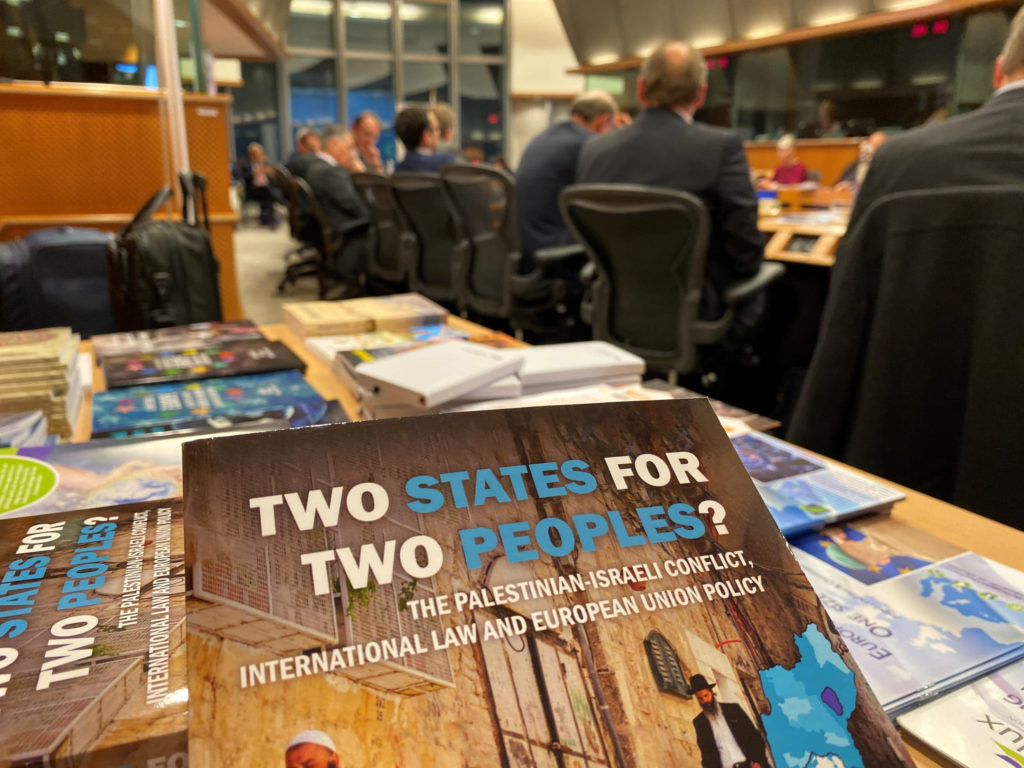Authors outlined the legal, historical and practical problems with the policy that the EU has advocated since the 1970s.
By Batya Jerenberg, World Israel News
A European think tank of international law experts came out last week with a detailed study of the Palestinian-Israeli conflict and concluded that the European Union should dump the “two-state solution” policy as it has failed and does not align with EU interests.
The Hague Initiative for International Cooperation (thinc.) launched its 300-page analysis, called
“Two States for Two Peoples?” at the European Parliament in Brussels on December 7. Its authors, Andrew Tucker and Prof. Dr. Wolfgang Bock, outlined the legal, historical and practical problems with the policy that the EU has advocated since the 1970s.
These include the EU’s consistent disregard of the fact that all relevant Palestinian political organizations, including the Palestinian Authority (PA), have rejected all Israeli proposals in peace negotiations. Europe also ignores the Palestinians’ constant promotion of the destruction of Israel rather than the establishment of a democratically accountable and peaceful state alongside it, they noted.
Backed by meticulous research, the report indicates that the EU has interpreted international law incorrectly when claiming that Palestinians have a right to full-fledged sovereign statehood in Judea and Samaria and eastern Jerusalem, while dismissing Israel’s legitimate territorial rights to the region. The EU also sets a double standard for Israel, as it does not apply the same legal rhetoric to any other comparable conflicts or occupations in the world, according to the report.
On a practical level, the Palestinians have not managed to build democratic institutions or root out corruption and radicalization even after decades of European monetary assistance towards those goals that has cost the EU taxpayer tens of billions of euros. This puts a serious question mark on the feasibility of a Palestinian state, the report says.
Europe’s own self-interest should lead to a policy change, the authors say, noting that the “two-state” policy was demonstrably dictated by a then-heavy dependence on Middle Eastern oil. Since then, the region’s energy sources have greatly diversified. No less important, Gulf Arab countries are making peace with Israel even without the existence of a Palestinian state.
There has been a subsequent expansion of economic opportunities, which the EU can both encourage for the good of all and take advantage of for itself. the report continues. Israel, too, has become a much more significant partner with Europe in numerous fields, and good relations with the Jewish state should therefore be a prime interest.
Recommendations to promote peace
The law experts also made several policy recommendations that they say would have a better chance of leading to the aspired goal of peace between the two sides.
The EU should insist that, over the long term, Palestinian institutions be developed that promote human rights, equal freedom and security for all citizens, founded on the rule of law. Such an approach, they say, is consistent with EU values of human dignity, prosperity, regional peace and integration.
In addition, to combat the extremism that the Europeans oppose “everywhere else in the world,” the authors add, financial aid should be conditional on the performance of benchmarked requirements in three main areas: cultivating universal civil, religious, and political rights, encouraging personal liberty and equality, including acceptance of Jews as equal members of society, and normalizing relations with Israel in agreements such as the Abraham Accords.
Thinc. was established in 2017 specifically in the Hague as the global capital of international law with a specific mission to challenge the application of international law when misused to delegitimize the State of Israel, a practice known colloquially as “lawfare.”


